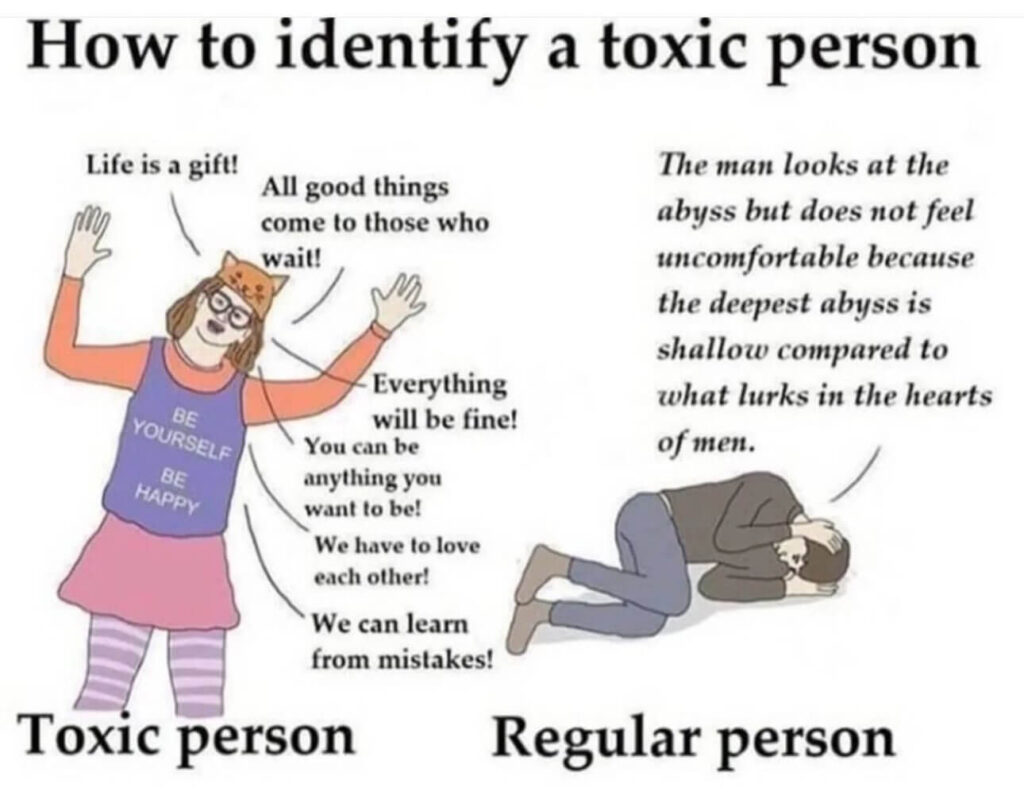
I found this image online, and it is a great example of what people consider as toxic positivity. After all, toxic positivity means being too positive in the face of a negative situation, such as a serious injury or death, telling people to “cheer up” or “look at the bright side of things,” being unable to sympathize with others hurt, emotional distress, or loss.
Whitney Goodman, author of the Toxic Positivity: Keeping It Real in a World Obsessed with Being Happy, calls toxic positivity a form of personal emotional gaslighting, urging people to be “sad when [we]’re sad and angry when [we]’re angry,” so we can fully experience our “rainbow of feelings.”
Toxic Positivity Criticism
The problem with Goodman’s words, or anyone else who is a supporter of the toxic positivity movement, is that being positive does not mean that we will need to fight for our life at every turn. In fact, truly negative events are rare, and when they happen a truly positive person will have enough emotional intelligence to deal with negativity in a healthy and mature way.
Furthermore, small or intermediate negative events happen to us all the time. Unfortunately, most people aren’t completely sure how to deal with this form of negativity and therefore they just learn to accept it, calling it normal or unavoidable, hence buying into the whole “let’s normalize being negative” culture.
As such, toxic positivity justifies negativity and keeps it in place, preventing us from looking for real solutions for negative thinking and behavior, such as learning how to be happy today and forever in a lasting, toxic positivity freeway.
Truly Happy People Aren’t Toxic
What I’m saying is that truly happy people aren’t delusional optimists. They are people with great emotional intelligence and a functional emotional toolkit, flexible enough to deal with both positivity and negativity situations, which occur to them as much as anyone else. They just deal with these situations in a different way than most.
As such, learning how to feel happy is the ultimate solution for our well-being, since happiness positively affects virtually every part of life.
Perhaps the only time I’d recommend buying into the whole toxic positivity nonsense is if we are unwilling to truly learn how to feel happy today and forever.
And yet, we only live once, and most of us want to have the best life possible, so instead of finding reasons to feel negative, or justifying our negativity whenever possible (such as buying into the toxic positivity myth), I propose that we learn how to be optimally happy in a lasting way.
Now, wouldn’t this be a nice way to lead our lives?
Toxic Positivity Test
To understand your personal beliefs about toxic positivity, please answer the following questions:
- Is extreme and lasting happiness possible? Why or why not?
Your answer: _____________________
- Is occasional negativity important, healthy, and desired? Why or why not?
Your answer: _____________________
- How happy are you (lately, on an average day)? Rate your happiness on a 0-10 scale, 0 being extremely unhappy and 10 extremely happy.
Your answer: _____________________
Share your answers in the comments or in a private message.
__________
Source: Lyubomirsky. S., King, L., and Diener E. (2005). The benefits of frequent positive affect: Does happiness lead to success?. Psychological bulletin. 131(6), 803.















